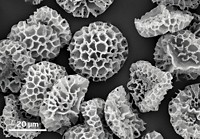Advertisement
Grab your lab coat. Let's get started
Welcome!
Welcome!
Create an account below to get 6 C&EN articles per month, receive newsletters and more - all free.
It seems this is your first time logging in online. Please enter the following information to continue.
As an ACS member you automatically get access to this site. All we need is few more details to create your reading experience.
Not you? Sign in with a different account.
Not you? Sign in with a different account.
ERROR 1
ERROR 1
ERROR 2
ERROR 2
ERROR 2
ERROR 2
ERROR 2
Password and Confirm password must match.
If you have an ACS member number, please enter it here so we can link this account to your membership. (optional)
ERROR 2
ACS values your privacy. By submitting your information, you are gaining access to C&EN and subscribing to our weekly newsletter. We use the information you provide to make your reading experience better, and we will never sell your data to third party members.
Biomaterials
Selenium helps synthetic melanin prevent radiation damage
The melanin analogue may be found in nature too
by Ariana Remmel
July 13, 2020
| A version of this story appeared in
Volume 98, Issue 27

Melanin biopolymers bring color to the natural world, from the brilliance of bird feathers to the hues of our own skin. These molecules also protect organisms from harmful radiation. A team of researchers led by Nathan Gianneschi, a chemist at Northwestern University, were inspired to upgrade melanin and help it do this job even better, potentially allowing chemists to formulate shielding materials that could protect people from the harsher radiation in outer space. Their new synthetic analogue, called selenomelanin, can be made by genetically engineered microbes or by synthetic chemistry, and outperforms its naturally occurring family members (J. Am. Chem. Soc. 2020, DOI: 10.1021/jacs.0c05573). The lowest dose of radiation tested—the equivalent of a cancer radiotherapy treatment—caused DNA damage in human epithelial cells treated with other melanin analogues. But selenomelanin-treated cells remained viable even after exposure to radiation at levels that would kill an adult. Gianneschi wonders if a biotic form of selenomelanin remains to be discovered. “Maybe we can go into nature and find it,” he says. His team is now collaborating with biologists to search for evidence of naturally occurring selenomelanin in the Salton Sea—a selenium-contaminated lake in Southern California.





Join the conversation
Contact the reporter
Submit a Letter to the Editor for publication
Engage with us on Twitter